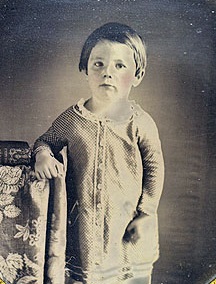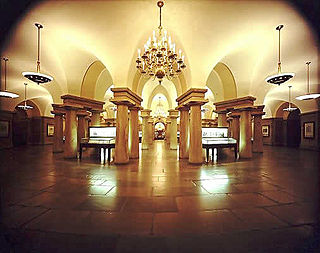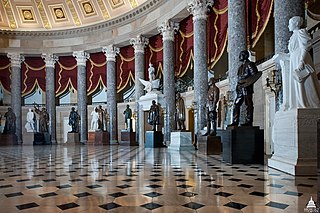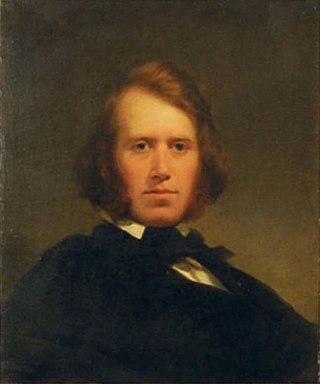
The United States Capitol, often called the Capitol or the Capitol Building, is the seat of the United States Congress, the legislative branch of the federal government. It is located on Capitol Hill at the eastern end of the National Mall in Washington, D.C. Although no longer at the geographic center of the national capital, the U.S. Capitol forms the origin point for the street-numbering system of the district as well as its four quadrants. Like the principal buildings of the executive and judicial branches, the Capitol is built in a neoclassical style and has a white exterior.
The year 1820 in architecture involved some significant events.
Edward Baker or Ted Baker may refer to:

Edward Dickinson Baker was an American politician, lawyer, and US army officer. In his political career, Baker served in the U.S. House of Representatives from Illinois and later as a U.S. Senator from Oregon. He was also known as an orator and poet. A long-time close friend of the President of the United States, Abraham Lincoln, Baker served as U.S. Army colonel during both the Mexican–American War and the American Civil War. Baker was killed in the Battle of Ball's Bluff while leading a Union Army regiment, becoming the only sitting U.S. senator ever to be killed in a military engagement.

The Thurgood Marshall Federal Judiciary Building (TMFJB) at the crossroads of the Capitol Hill and NoMA neighborhoods in Washington, D.C., houses offices that support the work of the United States Courts, including the Administrative Office of the United States Courts, the Federal Judicial Center, the United States Sentencing Commission, and the Office of the Clerk of the Judicial Panel on Multidistrict Litigation.

Edward Baker Lincoln was the second son of Abraham Lincoln and Mary Todd Lincoln. He was named after Lincoln's close friend, Edward Dickinson Baker. Both Abraham and Mary spelled his name "Eddy"; however, the National Park Service uses "Eddie" as a nickname and the nickname also appears spelled this way on his crypt at the Lincoln tomb.

The United States Capitol crypt is the large circular room filled with forty neoclassical Doric columns directly beneath the United States Capitol rotunda. It was built originally to support the rotunda as well as offer an entrance to Washington's Tomb. It currently serves as a museum and a repository for thirteen statues of the National Statuary Hall Collection.

The United States Capitol features a dome situated above its rotunda. The dome is 288 feet (88 m) in height and 96 feet (29 m) in diameter. Designed by Thomas U. Walter, the fourth Architect of the Capitol, it was constructed between 1855 and 1866 at a cost of $1,047,291. The Statue of Freedom tops the lantern on the dome, and the dome is centered over the origin on street maps of Washington, D.C.
The Progressive Party was a political party aligned to the Liberal Party that contested municipal elections in the United Kingdom.
Robert E. Lee is a bronze sculpture commemorating the general of the same name by Edward Virginius Valentine, formerly installed in the crypt of the United States Capitol as part of the National Statuary Hall Collection. The statue was given by the Commonwealth of Virginia in 1909. On December 21, 2020, the sculpture was removed from the grounds of the United States Capitol and relocated to the Virginia Museum of History & Culture.

Ethan Allen is a marble sculpture of Ethan Allen by Larkin Goldsmith Mead.

A bronze statue of the American politician Edward Lewis ("Bob") Bartlett by Felix de Weldon is installed at the United States Capitol in Washington, D.C., as part of the National Statuary Hall Collection. The statue was gifted by the U.S. state of Alaska in 1971.

William Borah is a bronze sculpture depicting the American politician of the same name by Bryant Baker, installed in the United States Capitol Visitor Center's Emancipation Room, in Washington, D.C., as part of the National Statuary Hall Collection. The statue was gifted by the U.S. state of Idaho in 1947.

The National Statuary Hall Collection holds statues donated by each of the United States, portraying notable persons in the histories of the respective states. Displayed in the National Statuary Hall and other parts of the United States Capitol in Washington, D.C., the collection includes two statues from each state, except for Virginia which currently has one, making a total of 99.

Helen Keller is a bronze sculpture depicting the American author and political activist of the same name by Edward Hlavka, installed in the United States Capitol Visitor Center's Emancipation Hall, in Washington, D.C., as part of the National Statuary Hall Collection. The statue was gifted by the U.S. state of Alabama in 2009, and replaced one depicting Jabez Lamar Monroe Curry, which had been donated in 1908.

John M. Clayton is a 1934 marble sculpture depicting the American lawyer and politician of the same name by Bryant Baker, installed in the United States Capitol, in Washington D.C., as part of the National Statuary Hall Collection. It is one of two statues donated by the state of Delaware The statue was accepted in the collection by Robert G. Houston on June 6, 1934.

Caesar Rodney is a marble sculpture depicting the American lawyer and politician of the same name by Bryant Baker, installed in the United States Capitol's crypt, in Washington, D.C., as part of the National Statuary Hall Collection. The statue was gifted by the U.S. state of Delaware in 1934.

Edward Douglass White is bronze sculpture depicting the American politician and jurist of the same name by Arthur C. Morgan, installed in the United States Capitol Visitor Center, in Washington, D.C., as part of the National Statuary Hall Collection. The statue was donated by the U.S. state of Louisiana in 1955.

The Statue of Abraham Lincoln by Vinnie Ream is installed in the United States Capitol's rotunda, in Washington, D.C. The statue was completed in 1871.

Horatio Stone, was an American sculptor, physician, and writer. He is best remembered for his three statues in the U.S. Capitol.
















